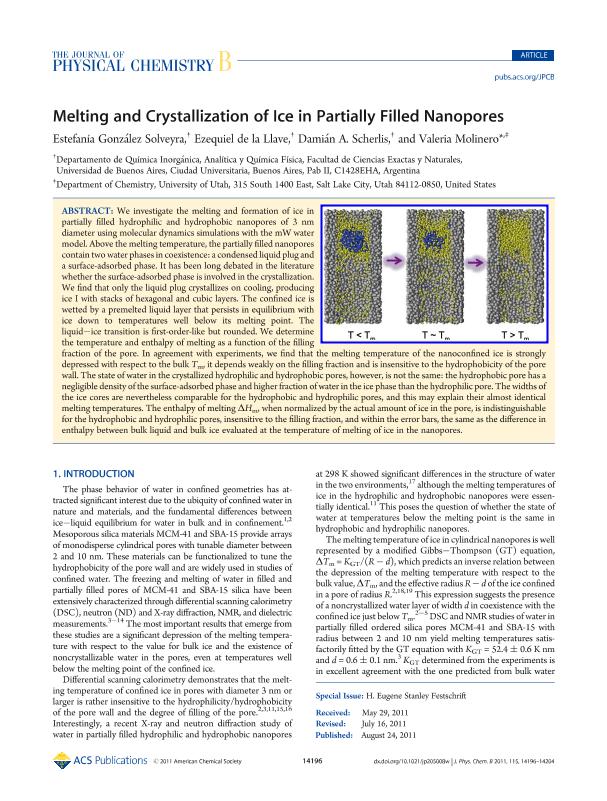Mostrar el registro sencillo del ítem
dc.contributor.author
Gonzalez Solveyra, Estefania

dc.contributor.author
de la Llave, Ezequiel Pablo

dc.contributor.author
Scherlis Perel, Damian Ariel

dc.contributor.author
Molinero, Valeria
dc.date.available
2019-03-08T19:51:05Z
dc.date.issued
2011-12
dc.identifier.citation
Gonzalez Solveyra, Estefania; de la Llave, Ezequiel Pablo; Scherlis Perel, Damian Ariel; Molinero, Valeria; Melting and crystallization of ice in partially filled nanopores; American Chemical Society; Journal of Physical Chemistry B; 115; 48; 12-2011; 14196-14204
dc.identifier.issn
1520-6106
dc.identifier.uri
http://hdl.handle.net/11336/71272
dc.description.abstract
We investigate the melting and formation of ice in partially filled hydrophilic and hydrophobic nanopores of 3 nm diameter using molecular dynamics simulations with the mW water model. Above the melting temperature, the partially filled nanopores contain two water phases in coexistence: a condensed liquid plug and a surface-adsorbed phase. It has been long debated in the literature whether the surface-adsorbed phase is involved in the crystallization. We find that only the liquid plug crystallizes on cooling, producing ice I with stacks of hexagonal and cubic layers. The confined ice is wetted by a premelted liquid layer that persists in equilibrium with ice down to temperatures well below its melting point. The liquid-ice transition is first-order-like but rounded. We determine the temperature and enthalpy of melting as a function of the filling fraction of the pore. In agreement with experiments, we find that the melting temperature of the nanoconfined ice is strongly depressed with respect to the bulk Tm, it depends weakly on the filling fraction and is insensitive to the hydrophobicity of the pore wall. The state of water in the crystallized hydrophilic and hydrophobic pores, however, is not the same: the hydrophobic pore has a negligible density of the surface-adsorbed phase and higher fraction of water in the ice phase than the hydrophilic pore. The widths of the ice cores are nevertheless comparable for the hydrophobic and hydrophilic pores, and this may explain their almost identical melting temperatures. The enthalpy of melting ΔHm, when normalized by the actual amount of ice in the pore, is indistinguishable for the hydrophobic and hydrophilic pores, insensitive to the filling fraction, and within the error bars, the same as the difference in enthalpy between bulk liquid and bulk ice evaluated at the temperature of melting of ice in the nanopores. © 2011 American Chemical Society.
dc.format
application/pdf
dc.language.iso
eng
dc.publisher
American Chemical Society

dc.rights
info:eu-repo/semantics/openAccess
dc.rights.uri
https://creativecommons.org/licenses/by-nc-sa/2.5/ar/
dc.subject
Melting
dc.subject
Ccrystallization
dc.subject
Nanopores
dc.subject
Ice
dc.subject.classification
Otras Ciencias Químicas

dc.subject.classification
Ciencias Químicas

dc.subject.classification
CIENCIAS NATURALES Y EXACTAS

dc.subject.classification
Otras Ciencias Químicas

dc.subject.classification
Ciencias Químicas

dc.subject.classification
CIENCIAS NATURALES Y EXACTAS

dc.title
Melting and crystallization of ice in partially filled nanopores
dc.type
info:eu-repo/semantics/article
dc.type
info:ar-repo/semantics/artículo
dc.type
info:eu-repo/semantics/publishedVersion
dc.date.updated
2019-01-09T14:21:58Z
dc.journal.volume
115
dc.journal.number
48
dc.journal.pagination
14196-14204
dc.journal.pais
Estados Unidos

dc.journal.ciudad
Washington
dc.description.fil
Fil: Gonzalez Solveyra, Estefania. Consejo Nacional de Investigaciones Científicas y Técnicas; Argentina. Universidad de Buenos Aires. Facultad de Ciencias Exactas y Naturales. Departamento de Química Inorgánica, Analítica y Química Física; Argentina
dc.description.fil
Fil: de la Llave, Ezequiel Pablo. Consejo Nacional de Investigaciones Científicas y Técnicas; Argentina. Universidad de Buenos Aires. Facultad de Ciencias Exactas y Naturales. Departamento de Química Inorgánica, Analítica y Química Física; Argentina
dc.description.fil
Fil: Scherlis Perel, Damian Ariel. Consejo Nacional de Investigaciones Científicas y Técnicas; Argentina. Universidad de Buenos Aires. Facultad de Ciencias Exactas y Naturales. Departamento de Química Inorgánica, Analítica y Química Física; Argentina
dc.description.fil
Fil: Molinero, Valeria. University of Utah; Estados Unidos
dc.journal.title
Journal of Physical Chemistry B

dc.relation.alternativeid
info:eu-repo/semantics/altIdentifier/doi/https://dx.doi.org/10.1021/jp205008w
dc.relation.alternativeid
info:eu-repo/semantics/altIdentifier/url/https://pubs.acs.org/doi/10.1021/jp205008w
Archivos asociados
